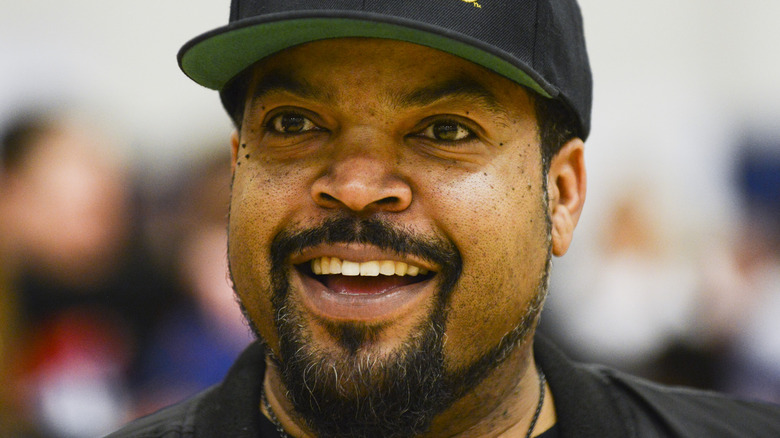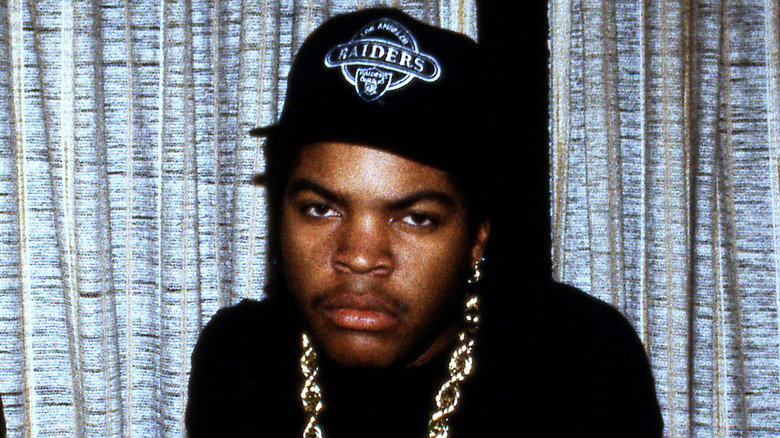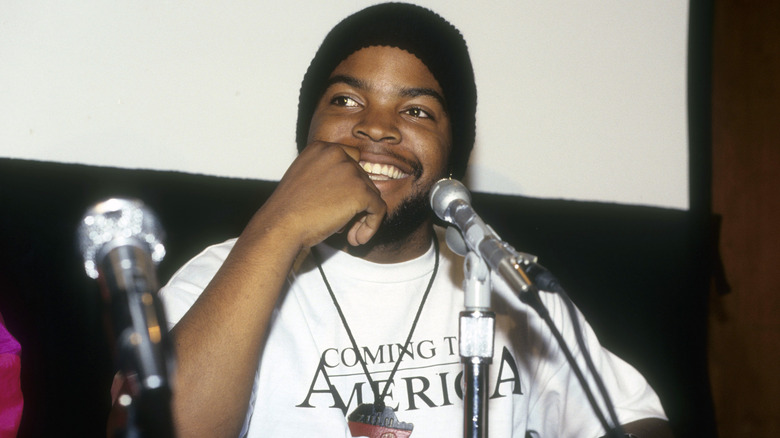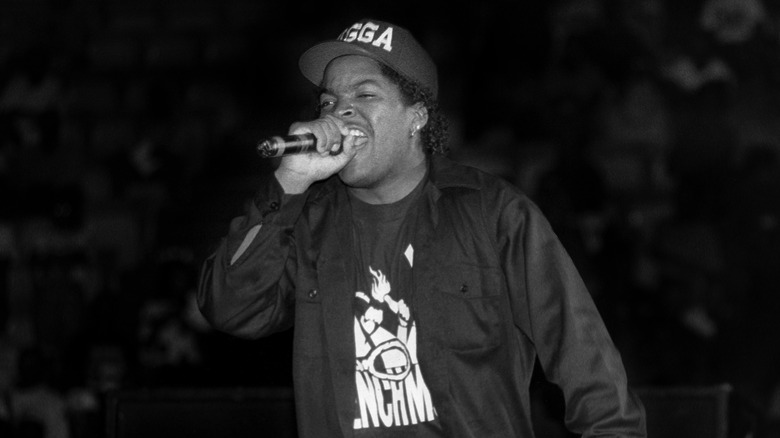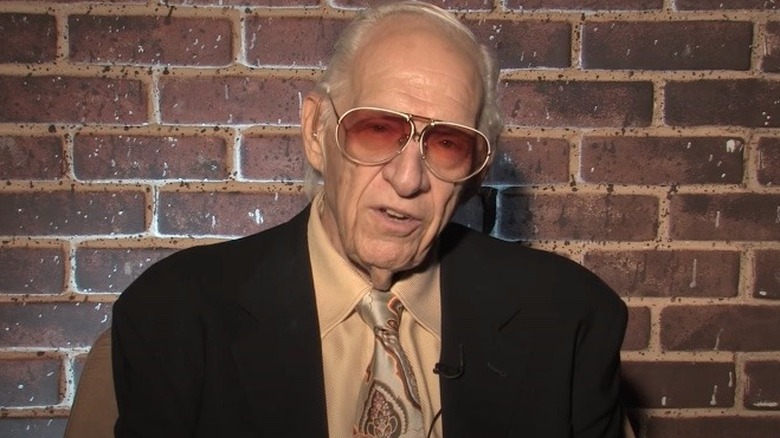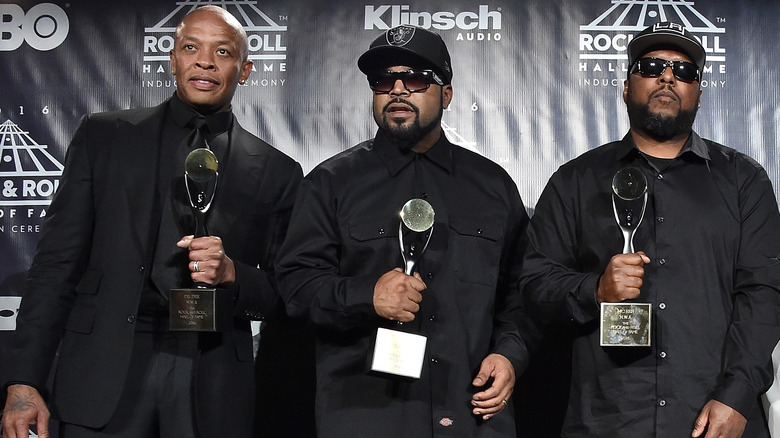Why Ice Cube Left N.W.A.
If it wasn't for N.W.A., rap wouldn't have evolved the way it did in the years following the group's heyday. It wasn't an instant evolution, to be sure — the pop charts of the early '90s had guys who rapped about the friendzone, tried to make balloon pants into the next big fashion trend, or shamelessly quoted the bass line of a Queen/David Bowie classic while telling listeners to stop, collaborate and listen. But thanks to their brief, yet highly influential discography, the world was introduced to an edgier flavor of hip-hop, one that oftentimes shed light on the struggles young Black people were going through. Of course, this sub-genre was, and still is known to this day as gangsta rap.
When talking about the individuals who crafted the streetwise "reality rap" rhymes that made up N.W.A.'s songs, O'Shea Jackson, aka Ice Cube, gets a lot of the credit. Younger listeners may mostly recognize him as an elder statesman of rap, or as someone whose acting skills and comedic chops helped him become a mainstay of the "Friday" and "Barbershop" film franchises. Before that, however, he was one of N.W.A.'s main lyricists, one-fifth of a veritable rap powerhouse and later on a successful solo artist in his own right. But why did he leave the group at the height of its fame? And how accurate was the depiction of his exit from N.W.A. in the 2015 biopic "Straight Outta Compton"?
Ice Cube first notices something is amiss
Thanks to their 1988 debut album, "Straight Outta Compton," as well as the controversial subject matter of songs like "F*** tha Police," N.W.A. had quickly established itself as an up-and-coming name in the hip-hop scene. People were buying their albums and showing up to their concerts in full force, many of them identifying with the gritty lyrics and themes. But it seemed that there were only two people who were enjoying the financial spoils of N.W.A.'s early success — Eazy-E and the group's manager, Jerry Heller.
Ice Cube was quick to notice this, and in the "Straight Outta Compton" biopic, where he was played by his son, O'Shea Jackson Jr., Cube looks bemused upon seeing Heller (Paul Giamatti) and Eazy (Jason Mitchell) dining on lobster. It's not depicted in the film, but at that time, Cube was still living with his parents — not what you'd expect from an up-and-coming rapper whose group has just released a massively popular album. Heller and Eazy, meanwhile, were living the high life, driving fancy cars and buying large mansions.
Speaking to The Guardian, Cube explained that it was his publicist, Pat Charbonnet, who helped him realize that "the situation with [N.W.A.'s record label] Ruthless and Jerry Heller just wasn't right." The next step for him was to go solo, but what about that scene in the film where Cube actually quits the group?
Cube felt he wasn't getting the royalty money he deserved
In the film "Straight Outta Compton," Jerry Heller presents Ice Cube with his individual contract, and if he signs, he stands to receive a check worth $75,000. Cube says he'll review the contract with a lawyer, but after Heller shoots this down by warning him about how lawyers are "paid to make trouble," an argument ensues, not just about the contract but also about the money Cube feels he should be getting for his creative contributions. Cube then ends the conversation with a simple "bye, Jerry, I'm out," refusing to sign the deal and effectively quitting N.W.A.
It's true that Cube left N.W.A. toward the end of 1989 because he suspected Heller was cheating him out of royalties, but that's not the whole story. He told The Guardian that after Pat Charbonnet convinced him that the situation with Eazy-E, Heller, and Ruthless Records was untenable, he named the publicist as his new manager. She then secretly negotiated with Bryan Turner, head of rival label Priority Records, informing him that Cube was no longer with N.W.A. and was officially a free agent. "She said: 'Cube's solo, you want to give him a deal? Or if not we're going to go get it somewhere else.'" the rapper recalled. "So [Turner] stepped up, and I'm glad he did."
Ultimately, Cube's relationship with Turner and Priority soured, and he got so angry over payment issues that he smashed up the label's office with a baseball bat, as he confirmed to the Chicago Tribune. But that's another story for another time because well before that incident took place, Cube had some would-be classics to record.
No Vaseline was a diss track for the ages
Now officially performing as a solo act and making music for Priority Records, Ice Cube released his debut album, "AmeriKKKa's Most Wanted," in 1990, and it peaked at a very respectable No. 19 on the Billboard 200 that summer. One year later, his sophomore effort, "Death Certificate," went all the way to No. 2 on the album charts, and while the song was not released as a single, "No Vaseline" still stands out as one of the record's most memorable tracks, if not the most memorable. That's because the song was an all-out diss track.
As evidently seen in the song's lyrics, Cube doesn't pull any punches as he fires away at everyone in N.W.A. — Eazy-E, Dr. Dre, MC Ren, and DJ Yella all get at least a few lines each of vitriol from their ex-bandmate. And while he isn't namechecked like the guys from N.W.A., Jerry Heller gets the worst of it, as Cube warns the group toward the end of the first verse that they're "getting f***ed out of your green by a white boy." Then there's the line about "getting money out your a** like a motherf***ing ready teller," which is an obvious reference to the man whose name rhymes with those last two words. No wonder Heller was portrayed in "Straight Outta Compton" the way he was — extremely irate over the lyrics, and upset that his clients were begrudgingly impressed by Cube's diss track.
Heller airs his side of the story
Two years before his death in 2016, Jerry Heller was interviewed by Ben Westhoff, author of the book "Original Gangstas: The Untold Story of Dr. Dre, Eazy-E, Ice Cube, Tupac Shakur, and the Birth of West Coast Rap." In an article he wrote for Forbes, Westhoff noted that Heller denied the accusations that he cheated the members of N.W.A., calling it the "most ridiculous allegation I've ever heard." He did confirm that Cube was indeed living with his parents amid the group's late-'80s breakout, though he also told the author that it's not unusual for musicians to receive album royalties well after the fact. "It takes a long time and most artists never recoup," record executive David Kronemeyer told Westhoff, corroborating Heller's explanation. "Ice Cube did, in fact, recoup in this situation, it just took a long time."
While he was described by Westhoff as a cagey interview subject, Heller had more to say about his issues with Cube. He revealed that he and the rap icon both had legal teams who reviewed Ruthless Records' files and found no financial inconsistencies. He also maintained that at the end of the day, Cube earned millions of dollars in the decades following the release of the album "Straight Outta Compton." And when it came to Cube and Dr. Dre's exits from N.W.A., Heller likewise denied Eazy's claim that he was partly at fault for their departures.
Did Ice Cube really agree to an N.W.A. reunion if Heller was fired?
Despite the bad blood that ensued after Ice Cube — and later, Dr. Dre — left N.W.A., there were apparently plans for a full reunion shortly before Eazy-E's death in 1995. That's the narrative laid out in "Straight Outta Compton," as the film's final act sees Ice Cube agreeing to a reunion under one condition — the group should make sure Jerry Heller isn't involved. That serves as the impetus for Eazy to fire Heller, though the reunion never pushes forward. Eazy collapses in the studio while he, MC Ren, and DJ Yella are waiting for Dre and Cube to arrive, and he is later diagnosed with AIDS and told by the doctor that he only has a few months to live at the very most.
In his interview with The Guardian, Cube confirmed that he and Eazy had some conversations about bringing the band back together and that he only agreed to the reunion when Eazy told him that he had just sacked Heller. "[Eazy] was in his feud with Dre at the time," Cube said. "I told him if he could work that out, call me, and I'd be ready to go."
More than two decades later, in 2016, the surviving members of N.W.A. finally reunited for a one-off performance at the second weekend of Coachella (via the Los Angeles Times), though interestingly, Dre opted to perform a medley of his own songs during his cameo appearance with Cube, Ren, and Yella.
